Lars von Trier: the interview
‘I’m used to being disliked,’ says the Danish enfant terrible
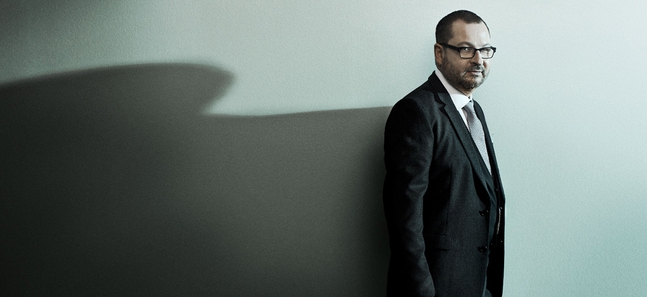
Posted: Wed Feb 15 2012
Lars von Trier famously doesn’t take planes – they scare him and so he travels everywhere by road. Which means that the trip back to Copenhagen from the Cannes Film Festival last year must have felt even longer than the 900 miles it was. The festival had booted out Von Trier and declared him persona non grata for making a joke about the Nazis at a press conference. The 55-year-old director drove home to Denmark with one of his sons and was dreading seeing his wife. ‘She was so angry with me,’ he remembers. ‘My son and I kept talking about staying the night in different bits of Denmark just to delay getting back. My wife is very sweet, but she just kept saying to me: “Lars, didn’t you think about the children?” ’
As he recalls this, he’s laughing a little, nervously, and his hands are shaking. It’s been a few months since Cannes, and he has had time to think. We meet in his work bungalow in the grounds of Zentropa, the company he runs out of an old barracks on the outskirts of Copenhagen. He’s wearing dark trousers, a black T-shirt and a leather jacket, and he comes in an electric golf buggy to pick me up from the canteen, where awards hang high above an old drum kit. There’s a Banksy-style stencilled sign on the wall that reads, ‘No artistic integrity beyond this point.’
Immediately, the riddles start. ‘First, I must apologise,’ he says, shaking my hand. ‘I’m sober, and that press conference in Cannes was the first one I ever did sober.’ I’m confused, I say. Usually people blurt out regrettable things when they’re drunk. He just laughs.
In the buggy we bounce over the concrete as it starts to rain, with me huddling close to the director of The Idiots and Dogville to avoid a soaking. I point out some impressive trees and he stops. ‘Recently, I’ve been teaching my kids the names of trees.’ So, which is this, I ask, amused to be seeking a nature lesson from the director of Antichrist. ‘That’s an ash. It has such beautiful leaves; I remember filming them for my first 8mm films. The problem is it’s also the symbol of a far-right party. And, also, Wagner wrote a lot about the ash. So I need to stay clear of it.’
But it’s just a leaf, I say, as we step out of the rain and into his cabin, outside of which he has parked a more regular form of transport, a small BMW. ‘No,’ he says, looking serious. ‘Nothing is ever just a leaf.’
The film that Von Trier was showing in Cannes back in May was Melancholia. But already his mind is on a new one, Nymphomaniac, which he says he’s ‘preparing very slowly’, adding that it will be ‘extremely long, extremely boring and extremely philosophical’. The title is a giveaway: it’s about sex and female sexuality. ‘I’m doing lots of research where I go out and talk to women, especially ones who have been screwing around like hell. And it’s so much fun. When they get to the age of 50, they can’t stop talking about it.’
He tells me about a prostitute in her forties – ‘a happy prostitute, or so she claims’ – who told him the only clients she couldn’t bear were masochists. He’s laughing a lot. ‘The masochists are never satisfied! You can’t do anything that is right, she said, you have to read their minds and they are so demanding.’ This amuses Von Trier a great deal, and you wonder with all this talk of masochists whether he’s thinking a little of himself – an awkward man, hard to satisfy, intent on inviting a beating wherever he goes.
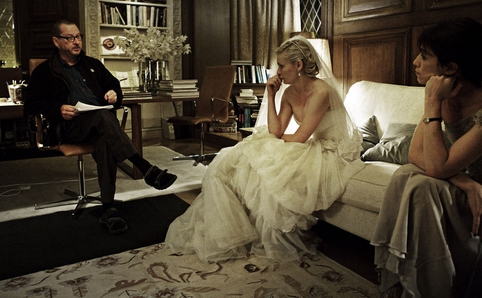
Lars von Trier with Kirsten Dunst and Charlotte Gainsbourg on the set of Melancholia
As a director, he’s been accused of sadism too, for putting his actresses and characters through the mill – Emily Watson in Breaking the Waves and Nicole Kidman in Dogville come to mind. But it looks like an empty accusation when you consider the many actors who come back for more. Charlotte Gainsbourg returned to make Melancholia after Antichrist, and Von Trier tells me that Kirsten Dunst – who sat wincing to his left throughout that disastrous press conference – wrote to him the other week to say she’d love to do another film with him. Mindful of how extreme Nymphomaniac will be, he turned her down. ‘I wrote back to her saying, “No you don’t! You don’t know what you’re saying!” ’
In the middle of talking about Nymphomaniac, he raises his voice. ‘There will be sex in the film. As a cultural radical, I can’t make a film without penetration. It would be ridiculous.’ I nod in understanding, as if talking as one porn director to another. Von Trier could speak about Nymphomaniac all day, but I push the discussion towards Melancholia, a pristine but lethargic film that unfolds over a few days at the country-house wedding of a woman called Justine, played by Dunst. She’s a depressive, and the impending end of the world is only making things worse. There are Dogme-style, shaky-cam episodes illustrating her absurd wedding, where actors including John Hurt, Kiefer Sutherland and Charlotte Rampling join the ensemble. There are quieter moments too, in the days that follow as Justine and her sister Claire (Charlotte Gainsbourg) react differently to the apocalypse.
Von Trier is prone to dismiss Melancholia, which he says was ‘a bit rushed’. When I ask if he’s happy with the film, about which I have doubts, he sighs and lets a moment of silence pass. Then another sigh. ‘It’s a little difficult to answer.’ A pause. ‘I feel ashamed a bit because I take the easy way out with this film.’ He lunges for a gardening analogy and explains how the stick should always be higher than the flower you want to grow up it. ‘The stick I used for Melancholia was maybe not high enough.’ He looks agonised and then perks up suddenly. ‘But I had a lot of fun doing it.’ That’s okay, then, I say. ‘No. Being Protestant, that’s not okay.’
I suggest to Von Trier that both Antichrist and Melancholia are painterly, which is unusual for a man who stripped cinema bare with his Dogme film The Idiots and his two Brechtian tales, Dogville and Manderlay, each shot on bare soundstages with chalk markings to denote walls. In contrast, Antichrist and Melancholia are carefully lit and composed, and many frames would work as photographs of the likes that Gregory Crewdson shoots – suggestive, overwrought, menacing, full of meaning. If you look at some of the shots of Melancholia, you could even call them – God forbid for an ageing film-school punk like Von Trier – beautiful. ‘Which I’m not proud of,’ he says. It hasn’t happened by accident, I say. He sinks into the sofa. ‘It’s just I have other… ideals.’
At the time of the release of Antichrist in 2009, Von Trier spoke about how he made the film during a depression. Has he put it behind him? ‘The depression? Yeah, I think so. It takes a couple of years.’ Did he have therapy? ‘Yes. The idea is that you have given up. You lie there, face a wall and cry. They ask what you hate the least, then I say a computer game I played years ago. “Okay,” they say. “So that will be your treatment, three times a day for five minutes.” That’s how you start. Then there are medications, of course. It’s about trying to put your life back together.’
He explains that as awful as depression was, it gave him a release from anxiety. ‘It was building up and the depression is a break from it. You fall down and you’re like a bird with a cat and you say: “Eat me, for Christ’s sake!” And it’s a good thing. It’s terrible for the family, of course, and all the children think it’s their fault and don’t know what’s happening. But maybe it’s good that they see this side of life.’ At the time, many people scoffed at Von Trier’s explanation that Antichrist had emerged from a depression. It was just another stunt, they said. Yet listening to him talk now, it’s hard to deny his suffering was genuine.
He says he was wrong to portray his relatives that way, especially as in reality they had nothing to do with the Nazis. Quite the opposite. ‘During the war, my mother went to Sweden because she was a resistance fighter and my adopted father went there because he was Jewish. My real father went to Sweden too as a freedom fighter. But they were German, that was what I meant.’
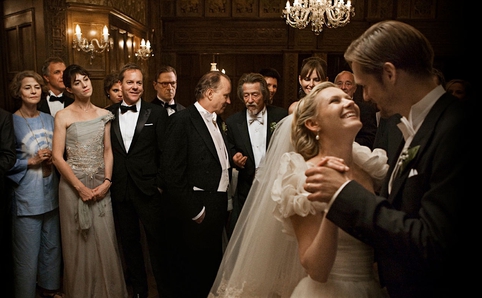
A scene from Melancholia.
(C) 2011 Zentropa Entertainments ApS27
He’s decided to embrace his Jewish background more. The Jewish parent who raised him may not have been his real father but ‘this Jewishness is my upbringing… My decision is that I’m as good a Jew as anyone. That’s where I come from. I don’t give a shit where the sperm comes from. I’m a cultural Jew.’
He also says he won’t be doing any more press conferences as they’re ripe for misunderstanding. ‘If I say to you now, I’m a Nazi, you’ll say: “What do you mean?” And some sense might come out of it.’ But he’s already broken that rule. The week before we speak, he went to Berlin to make an appearance at a retrospective. He says he was treated ‘like a rock star’ by the audience and ‘500 people’ asked him for an autograph. He says with a chuckle that every time he ‘said the word “Nazi”, they were going, “Yeah!” That’s dangerous for me, of course, as I was pleased by that.’ He also says he shared his thoughts with the crowd that ‘the real Nazis were the French’. What does he mean by that? ‘It’s this feeling I have that the whole anti-Semitic thing was something Hitler stole from the French.’
We don’t have time to dance on that minefield. But it’s not the last time Hitler comes up. We talk about how in Cannes he said he can ‘understand’ Hitler ‘a little’. He’s unrepentent. ‘I know it sounds unpleasant, but I believe we can learn things from what has happened, and if we make a lot of taboos about it, it will slow this process down or stop it completely – which would be so unfair to the people who died in Auschwitz, for instance.’
We talk at length about the threat of the far right in Denmark and how disgusted this makes him feel. He felt forced to comment after it emerged that Anders Behring Breivik, the Norwegian who killed 77 people in July last year, had listed Dogville as a favourite film on Facebook. That horror prompted him to speak out against the anti-immigration Danish People’s Party (DPP), which won almost 14 percent of the vote in 2007, and say it needed to take responsibility for spreading ideas to Norway. The response was curt. ‘They said they would never enter into a debate with a man who is mentally ill and a perverted Nazi.’
You could say he asked for that. On one hand, there’s the Von Trier who gets a thrill from talking blithely about Nazis in front of a crowd of Germans. On the other, there’s a thoughtful, uncompromising mind who isn’t willing to retreat into a shell just because he got his fingers burned. The first Von Trier doesn’t do any favours for the reputation of the second. But there’s something likeable about his willingness to mix serious comment with humour, and he spends much of our interview sniggering. His films have amazed, frustrated, moved and repulsed. Should we expect anything else from him?
He looks like he’s having a good time. And yet there’s that shaking of the hands, those frequent slips into the depths of the sofa and those groans that remind you that, for Von Trier, with pleasure comes pain.
As I stand to leave, I point to the tattoo he has of ‘Fuck’ on his knuckles. Somehow, I’d remembered him having the words ‘Love’ and ‘Hate’ on each hand. ‘Oh no,’ he says, ‘but, then again, “fuck” does sit between love and hate.’ At which he chuckles. A lot.
Melancholia is released nationwide on February 17
Tweets
- About Us |
- Work for Time Out |
- Send us info |
- Advertising |
- Mobile edition |
- Terms & Conditions |
- Privacy policy |
- Contact Us
Copyright © 2014 Time Out Tokyo










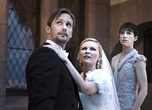
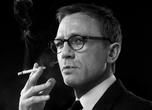


Add your comment